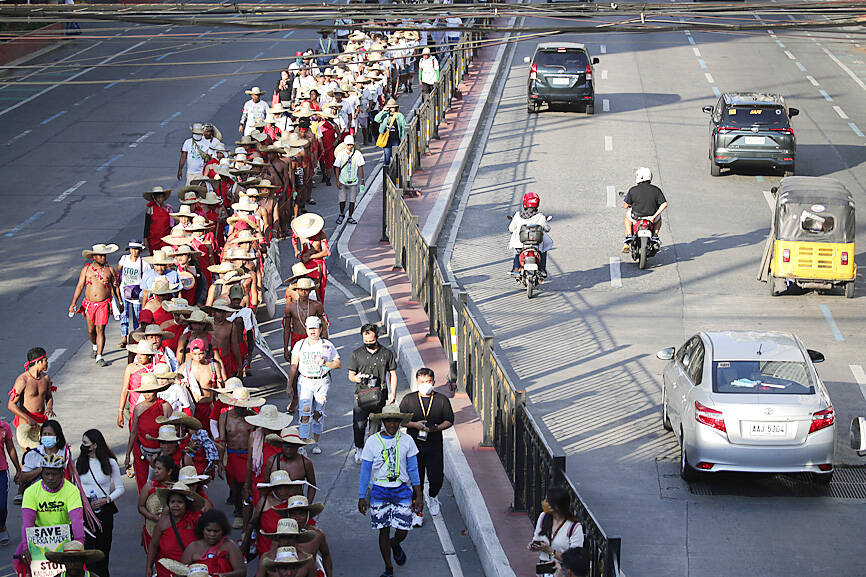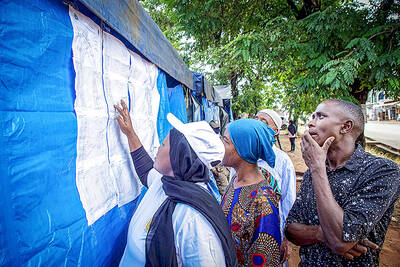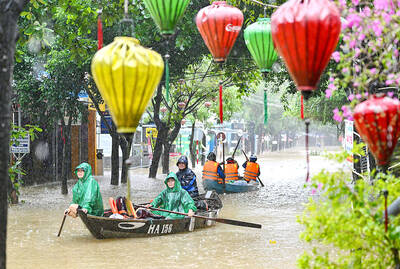For thousands of years, the Filipino Dumagat-Remontados indigenous people have cultivated their lands on the Sierra Madre mountain range. Soon, hundreds of hectares of their forests could be swallowed by a new major river dam.
Officials said the Kaliwa Dam is vital to supply the water-stressed region around the capital, Manila, but indigenous groups said they were not properly consulted in line with the law and the project threatens their traditional way of life.
“We went down from the mountains and walked because our rights were violated during the approval process for the dam,” said Conchita Calzado, an indigenous elder who last month led about 300 tribe members on a nine-day protest march from General Nakar in Quezon Province to Malacanang Palace in Manila.

Photo: EPA-EFE
“We are the communities whose livelihood, culture and sacred land will be directly affected,” she said.
The Metropolitan Waterworks and Sewerage System (MWSS), the government agency in charge of the capital region’s water resources, has said indigenous approval processes were followed and the dam is needed to avert a looming water crisis.
Residents are already experiencing water shortages in Metro Manila, a densely populated sprawl of 16 adjoined cities.
At present, 90 percent of the region’s drinking water comes from the 55-year-old Angat Dam, which can supply about 4,000 million liters per day.
MWSS said the Kaliwa Dam would improve water security and could supply an extra 600 million liters per day.
CHINESE LOAN
The 12.2 billion Philippine pesos (US$224.3 million) project, funded with a loan from China, is set to install a 60m high dam on the Kaliwa River in the mountain district of Quezon.
Only 15 indigenous families would be displaced from their homes as a result and the dam will be managed to prevent flooding, Jose Dorado, an MWSS official supervising the project, said in an interview.
The Stop Kaliwa Dam campaign, a group of environmental and indigenous groups, said at least 5,000 tribespeople are situated in the area of the planned dam, about 300 of whom would be directly affected, in addition to those displaced.
The dam would endanger 100,000 residents downstream with the risk of flooding, submerge at least six sacred sites, along with 291 hectares of forests, and destroy habitats of 126 species, a petition by the campaign says.
As the impact of climate change intensifies, countries are attempting to be proactive in adapting to coming changes and looking for ways to curb climate-changing emissions.
However, many potential adaptations and emissions-cutting efforts put pressure on limited land, with competing priorities, such as protecting nature and indigenous communities, boosting food security, mining minerals needed for the green transition and protecting land rights pitted against each other.
In some cases, the choices made threaten social unrest, especially if communities are uprooted or otherwise affected without consent or adequate compensation. They also raise questions about how to strike a balance among competing “good” uses for land.
Under the Philippine Indigenous Peoples’ Rights Act of 1997, indigenous people have the power to veto proposed development on their ancestral lands under a process of free, prior and informed consent (FPIC).
Five out of six indigenous Dumagat-Remontados communities in Quezon rejected the Kaliwa Dam plans during assemblies in 2019 as part of the FPIC process of consultation, the Stop Kaliwa Dam campaign told Philippine news media.
Last month, the MWSS said all six groups had given consent to the project in a FPIC process certified by the National Commission on Indigenous Peoples, a government agency.
Indigenous campaigner Calzado said the MWSS had misinformed or pressured some tribe members in an attempt to pick off opposition.
She said on one occasion tribal people were locked in a room and pressured to take an immediate vote, and that FPIC consent letters provided to indigenous people were not translated from English into Filipino or local languages.
There is “no truth” to these criticisms, Dorado said, adding that the MWSS followed the FPIC process, but critics had refused to participate, meaning they did not get the opportunity to vote.
Land rights campaigners have long said the FPIC consent process is often ignored or abused.
“Weak implementation” of the law means consultations are often “subverted” into a pro-forma process, said Ryan Roset, a senior legal fellow at the Legal Rights and Natural Resources Center, a Philippine environmental rights group.
“This practice emanates from a pernicious misappreciation and trivialization of the FPIC merely as a bureaucratic piece of paper and not as a right,” Roset said in an e-mailed comment.
“Not only does this disregard [indigenous] communities’ decision, it also engenders division among community members,” he added.
ALTERNATIVE OPTIONS?
The majority of the nation’s dams were built on indigenous land, said Teddy Baguilat, an indigenous former lawmaker.
“Indigenous peoples have sacrificed for decades because of these projects,” said Baguilat, leader of environmental group Angat Kalikasan. “We are not against development, but there are alternatives.”
Indigenous groups have resisted plans for at least six major dams within the past decade, according to the Environmental Justice Atlas, a global database of conflicts over natural resources and development.
The Kaliwa Dam is the best option for a major new water source for Metro Manila, as it would maximize supply output, but would entail the least habitat disruption and resettlement, the MWSS has said.
“We should complete the dam by the end of 2026, because if we don’t, we will have a huge water shortage,” Dorado said.
Campaigners against the dam have called for alternative “sustainable solutions,” including protecting existing watersheds and rehabilitating them with tree planting.
They have also urged officials to repair and dredge dams that have become silted up, fix leaking water distribution systems, and explore technologies like wastewater recycling.
“Ours is a giving culture. We are willing to share the river with those living in Metro Manila,” Calzado said. “We are just saddened by the way they forced our people to agree to the dam, which will destroy the land we’re supposed to pass down to our descendants.”

With much pomp and circumstance, Cairo is today to inaugurate the long-awaited Grand Egyptian Museum (GEM), widely presented as the crowning jewel on authorities’ efforts to overhaul the country’s vital tourism industry. With a panoramic view of the Giza pyramids plateau, the museum houses thousands of artifacts spanning more than 5,000 years of Egyptian antiquity at a whopping cost of more than US$1 billion. More than two decades in the making, the ultra-modern museum anticipates 5 million visitors annually, with never-before-seen relics on display. In the run-up to the grand opening, Egyptian media and official statements have hailed the “historic moment,” describing the

‘CHILD PORNOGRAPHY’: The doll on Shein’s Web site measure about 80cm in height, and it was holding a teddy bear in a photo published by a daily newspaper France’s anti-fraud unit on Saturday said it had reported Asian e-commerce giant Shein (希音) for selling what it described as “sex dolls with a childlike appearance.” The French Directorate General for Competition, Consumer Affairs and Fraud Control (DGCCRF) said in a statement that the “description and categorization” of the items on Shein’s Web site “make it difficult to doubt the child pornography nature of the content.” Shortly after the statement, Shein announced that the dolls in question had been withdrawn from its platform and that it had launched an internal inquiry. On its Web site, Le Parisien daily published a

UNCERTAIN TOLLS: Images on social media showed small protests that escalated, with reports of police shooting live rounds as polling stations were targeted Tanzania yesterday was on lockdown with a communications blackout, a day after elections turned into violent chaos with unconfirmed reports of many dead. Tanzanian President Samia Suluhu Hassan had sought to solidify her position and silence criticism within her party in the virtually uncontested polls, with the main challengers either jailed or disqualified. In the run-up, rights groups condemned a “wave of terror” in the east African nation, which has seen a string of high-profile abductions that ramped up in the final days. A heavy security presence on Wednesday failed to deter hundreds protesting in economic hub Dar es Salaam and elsewhere, some

Flooding in Vietnam has killed at least 10 people this week as the water level of a major river near tourist landmarks reached a 60-year high, authorities said yesterday. Vietnam’s coastal provinces, home to UNESCO world heritage site Hoi An ancient town, have been pummeled by heavy rain since the weekend, with a record of up to 1.7m falling over 24 hours. At least 10 people have been killed, while eight others are missing, the Vietnamese Ministry of Natural Resources and Environment said. More than 128,000 houses in five central provinces have been inundated, with water 3m deep in some areas. People waded through